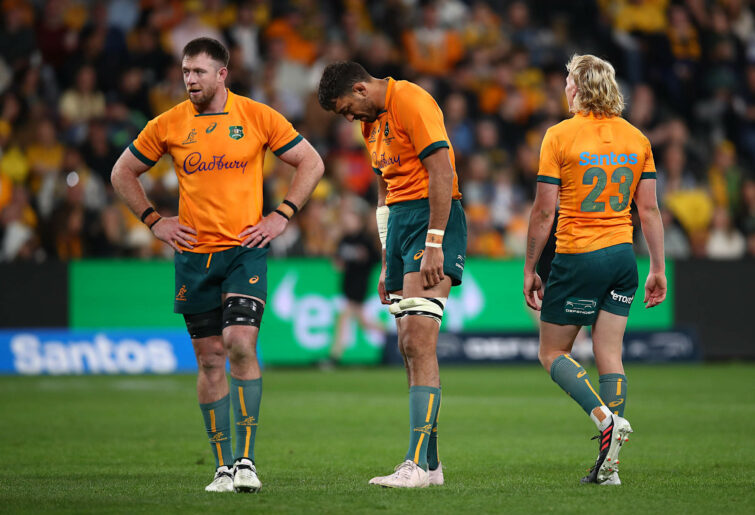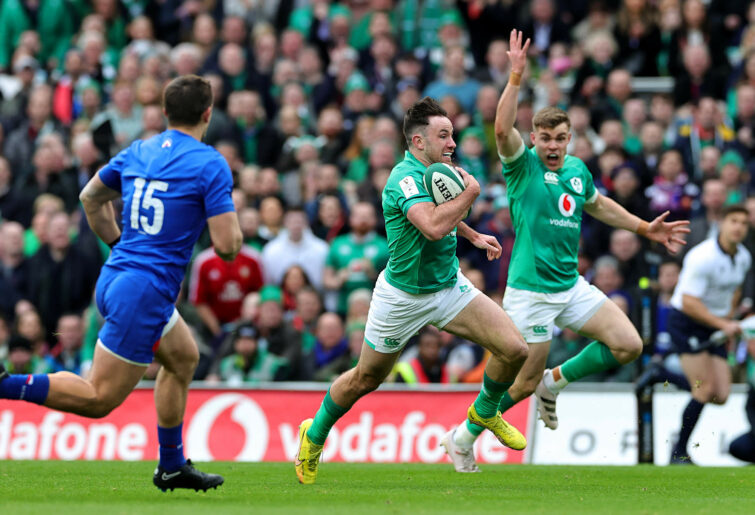We’ve all been a bit too defensive of late, and not much of it has been in a good way.
But I’ve come to appreciate over the last few days that the Wallabies’ defensive issues have been drawing much more commentary, and that perhaps this is actually a very good thing.
It’s certainly been needed after the opening fortnight of The Rugby Championship, though the defensive performance against Argentina in Sydney was significantly better than against South Africa in Pretoria the week before. So it needed to be, for the record.
But I figure it might be a good thing that it’s being discussed so freely, because surely if the media and fan discussions and podcasts and the socials are full of opinions and analysis as to what’s going wrong, then we’d have to assume that it’s being discussed and ideally worked on pretty bloody hard in the Wallabies camp this week.
“These sorts of teething problems are sometimes the best problems to have,” Eddie Jones said on Saturday, moments after describing long-serving coach Laurie Fisher’s observations about the Wallabies defensive set-up as “inappropriate.”
“Sometimes you find out more about your team in these situations than you do when you think things are going along swimmingly. And they’re not going along swimmingly,” Jones added.
Fisher spoke to Harry Jones and myself on The Roar Rugby Podcast last week in what is about to become our most listened-to episode ever, overtaking the Eddie Jones episode from last month, in an irony of all ironies.
Asked what sort of messages young players in the squad would be getting in camp, Fisher spoke with all the scything honesty of a senior coach about to enter the in-demand world of coaching consultancy.
“From watching the game, I don’t know that they have great clarity themselves at the moment,” Fisher told us.
“They have a new defensive coach who’s never coached rugby union, hasn’t played rugby union.
“He’s obviously working on connection and kick chase and first phase. Is he also talking about what is our contest policy between the 15s, what do you do in our own 22? I saw guys having a crack, but I didn’t see a designated policy of how we’re going to get some pressure on their ball.”
Quick to defend Brett Hodgson, Jones decided they weren’t kosher from a member of the Australia A coaching staff, but then offered a curious footnote.
“He’s a smart coach and he did a great job with defence for Australia A, so we can take good consolation from that and if we need someone to help us, we can use him.”
And that’s great, but he was also available to help in January.
Regardless, defence is a hot topic again and so is the Wallabies discipline, highlighted by Iain Payten in an enlightening analysis piece for the Sydney Morning Herald over the weekend, documenting the alarming rate at which the trend of penalties conceded has plagued the Wallabies for way too long.
“The 14 penalties conceded by the Wallabies in Parramatta was the 27th-straight Test in which the team coughed up a double-digit penalty count, dating back to 2021,” Payten wrote.
“Last year, the Wallabies’ problems escalated rapidly. They became the most penalised team in world rugby’s top tier, with an average of 13.6 penalties per game; up from the 10-11 per game range of the last decade. To compound the problem, the Wallabies were also the most carded team in world rugby in 2022; with 15 yellow cards and one red, in 15 Test matches.”
And already in 2023, the Wallabies have conceded three yellow cards in 160 minutes.
But what’s curious to me out of this is that the 36-man squad for the Springboks and Pumas contained 25 players from the Brumbies, Waratahs and Reds collectively, the three teams among the best in Super Rugby Pacific for fewest yellow cards, and also for turnovers conceded.
The Reds and Waratahs less so, but the Brumbies were also the least penalised side in the competition by the end of the home-and-away rounds. Either way, all three conceded well fewer than the 14.2 penalties per game the Wallabies have conceded in the last fortnight.

(Photo by Jason McCawley/Getty Images)
So, the majority of the squad have come in from reasonably well-performed and well-structured units in these key areas, but it somehow and suddenly turns to custard when the state colours are replaced by national kit. What on earth happens in Wallabies camp?
Equally illustrative was a couple of Ben Darwin tweets in response to the SMH article, particularly pertaining to the fact teams give away more penalties in defence, and that relatively speaking, the Wallabies are “giving away less penalties per minute in defence than everyone else.”
Silver linings, I suppose.
But here was the kicker.
“In each of the games played in the last 2 years the penalty count matches the tackles made.”
So the Wallabies, already making more tackles and giving up more possession than their skillset allows, are conceding more and more penalties because that’s what naturally happens when you’re defending.
We’ve all been guilty of offering variations of the same observation, that ‘The Wallabies need to fix their discipline, and they need to sort out their defence, too’, but when the two points are intrinsically linked as they are, addressing one will quite likely help resolve the other.
How? Well, hold onto the ball more, certainly.
Using Ireland only as an example, in this year’s Six Nations tournament they kicked for the third-longest distance, yet carried the most and made the most ground doing so (and averaged 6.2 metres per carry). They made the second-most number of passes, yet ranked fifth for offloads.
They still conceded the third-highest number of turnovers, but won more turnovers themselves by a long way and won more turnovers in tackle situations than every other team.
Ireland still kicked, but they held the ball when it mattered and tested defences with ball in hand, and just harangued the breakdown like nobody’s business.

(Photo by David Rogers/Getty Images)
They attacked with the ball and without the ball, and finished the tournament with the biggest differential between tries scored and tries conceded, and it wasn’t even close.
Ireland also conceded just 8.8 penalties per Six Nations game, and did not concede a card of any colour.
It’s madness to expect the Wallabies to try and play an attacking game with possession percentages in the thirties, and it’s equally mad to expect fewer penalties conceded when they’re making considerably more tackles than any other team.
Eddie Jones wants the Wallabies to play unstructured rugby, but no team can play unstructured defence.
The Wallabies might not win games with unstructured attack, but they definitely won’t win anything with unstructured defence. That was Laurie Fisher’s whole point.
If the coach really wants to cut down on mistakes, and do more with the ball, and concede fewer penalties, then it has to start by having to defend a whole lot less than they are right now.






























































































